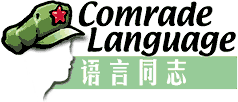|
According to a poll of foreigners living in China, shopping was the most popular complaint (right after traffic, spitting, IPR infringements, staring, taxi drivers, migrant workers, pollution, noise and unfair business practices).
Some foreigners have groceries delivered right to their villa homes. They fly to Hong Kong on a whim every time they need 防汗液 fanghanye (deodorant) or 衣服 yifu (clothes). And they use their (or their spouse's) company motorcycle delivery guy to run errands for them. To these foreign friends, Comrade Language is nothing more than a bunch of obscure and senseless
gibberish.
But if you're the type who get the gumption to queue up with the proletariat... if you're got the 胆子 danzi (lit. gallbladder; 'guts') to cram onto a crowded public bus at 高峰 gaofeng (rush hour)... if the thought of 入乡随俗 ruxiangsuisu ('doing as the Romans do') doesn't disgust you, then read on...
While its true that you'll never amount to anything more than a 老外 laowai in the slanted eyes of the Chinese masses, you should still do your best to 掌握 zhangwo (grasp) the language and understand the culture. Especially when it comes to spending money, i.e. shopping. According to a poll of foreigners living in China, shopping was the most popular complaint right after traffic, spitting, IPR infringements, staring, taxi drivers, migrant workers, pollution, noise and unfair business practices.
百货商店 baihuo shangdian (department stores), also called 百货大厦 baihuo dasha and 百货大楼 baihuo dalou (when referring to multi-level malls), sell everything under the sun-from childrens clothing to sex toys. Nowadays most of them even have a food court where you can 休息一下 xiuxi yixia (have a rest; take a break) and sample some cheap local fare or pathetic attempts at foreign foods.
Look for 电梯 dianti (lit. 'electric lifts'; escalators) in the most 想不到 xiangbudao (unexpected) and inconvenient places. (Note: proper escalator etiquette dictates that you 犹豫 youyu (waver) apprehensively at the top (or foot) of an escalator for a few moments before finally stepping onto it. After getting off an escalator, stand in front of it for a few moments, the way you would stand in front of an elevator door after stepping out).
Department stores, like all other stores in China, come in two types:
国营店 guoying dian (State-run stores) and 私营店 siying dian (privately owned stores). Faced with stiff, hard, throbbing competition from burgeoning private stores, many State stores have achieved a noticeable and commendable improvement in the quality of their service in the past few years. For example, 服务员 fuwuyuan (workers) hand customers their change instead of throwing it, and many workers even look up from their newspapers and mutter 欢迎光临
huanying guanglin ('welcome' ) when a customer walks in.
Remember that you can 讨价还价 taojia huanjia (bargain) in State run stores. But in many private stores it may be worth a try. Tell them if they refuse to give you a discount you'll request a 发票 fapiao (receipt). Once they 开发票 kaifapiao (open a receipt), they're accountable to pay tax on it, so sometimes they're willing to give you a discount if you agree not to ask for one.
Of course, you should ALWAYS bargain when buying from peddlers and hawkers or, ahem, "other" service providers. (Unless you're a selfish jerk who merrily reasons, "I' m sure I got ripped off, but it was still cheaper than back home"). Please remember that this type of 行为 xingwei (behavior) only makes it that much more difficult for the next guy to get a fair price. Don't fall victim to the Chinese business practice of 宰老外 zai laowai (ripping off foreigners).
The golden rule of bargaining is this: the price is ALWAYS too high. Arm yourself with the basic bargaining vocabulary: 太贵了 taiguile (too expensive), 便宜一点 pianyi yidian (cheaper) and 别开玩笑 bie kaiwanxiao (you've got to be kidding). Repeatedly ask 最低价格多少 "zuidi jiage duoshao?" ("what's the lowest price?"), and never express satisfaction at a price, even when you finally agree on one.
When shopping, you can ask the price of something by saying 几块钱 jikuaiqian (lit. how many yuan?) for inexpensive items, or 多少钱 duoshaoqian for prices higher than ten yuan. Sometimes it is necessary to ask a 务员 fuwuyuan where to find what you誶e looking for. Therefore, it is important to know how to properly phrase questions so that you'll get an acceptable answer.
There are three ways to ask a question in Chinese:
1. You can ask a question by offering a choice. For example, 有没有枕头 "You meiyou zhentou?" (lit. "Have/not have pillows?"). The 服务员 fuwuyuan responds by choosing either 有 "you" or 没有
"meiyou" This is the worst possible way you can phrase a question because you are giving the fuwuyuan the option of saying 没有 "meiyou".
2. By using a question word, you can effectively decrease the chances of getting 没有 "meiyou" as an answer. Say, 枕头在哪儿 "zhentou zai nar" (lit. "Pillows are where?"). The 服务员 fuwuyuan must replace the question word 哪儿 "nar" with an answer.
3. Finally, use a question particle like 呢 "ne", 吗 "ma" or 吧 "ba" to instantly transform an ordinary sentence into a question. Warning: use of these particles, like the choice-type question, increases the likelihood of getting 没有 "meiyou" as an answer.
The reason 没有 "meiyou" is such a hated and feared word is because of its ambiguity. When you ask for, say, an instructional golf video and the 服务员 fuwuyuan says 没有 "meiyou", you
're left wondering if (a) it is sold SOMEWHERE in the store, just not right here, (b) it is NOT sold in this store, or (c) what you have asked for simply
doesn't 存在 cunzai (exist) in China or
perhaps anywhere.
Now youre armed with the knowledge you need to go out and shop
'til you drop in China. Remember, you don't have to be a twenty-something pampered princess financially backed by a sugar daddy to enjoy wandering around shopping malls with a blank expression on your face.
|


